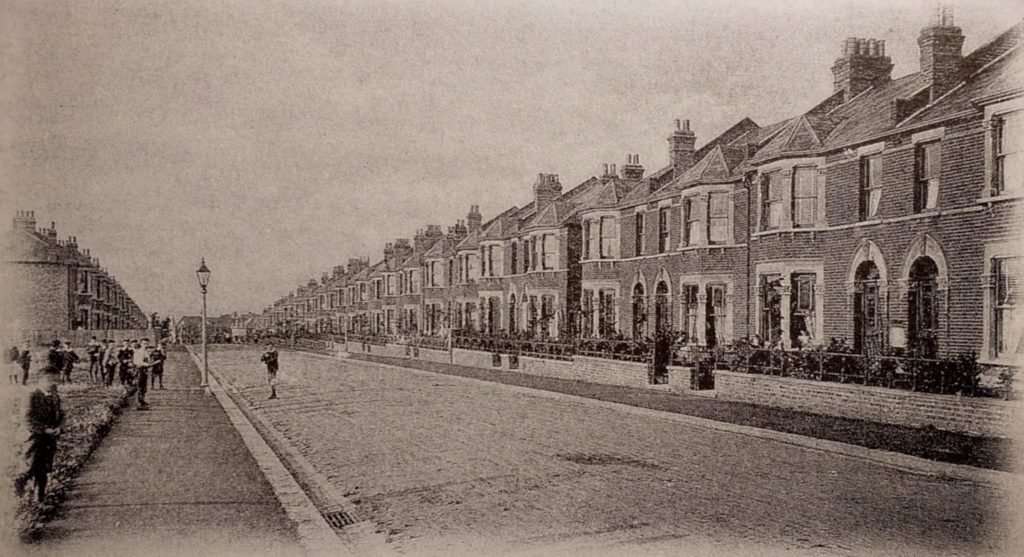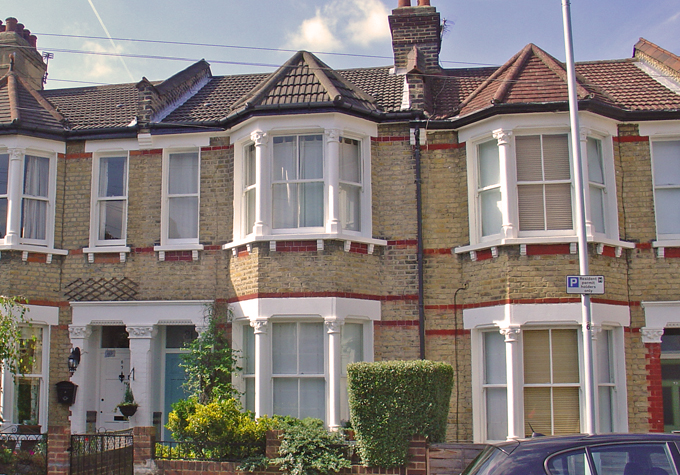A community centre in Lewisham (Photo by Chris J Ratcliffe/Getty Images)

The Corbett Estate is a neighbourhood of some 3,000 houses located between Hither Green and Catford in south-east London. The houses — mostly small Victorian-style terraces with generous gardens — were built by the Scottish MP, property developer and stern Presbyterian teetotaller Archibald Corbett in the late 1890s.
Many of the streets have Scottish names; many of the houses are graced with distinctive male or female keystones above the front door, rumoured to be based on Archie and his wife. The estate is at least a 15-minute walk from the nearest train station and is mostly an established family neighbourhood. I have lived here for three years and have fallen hard for its charms.
While Archibald Corbett’s legacy is widely known and celebrated with affection locally, it’s unlikely that his politics would go down well with many of his estate’s residents today: he was an unapologetic capitalist (Lewisham has been Labour for as long as anyone can remember) and he disapproved thoroughly of drinking (summer nights around here are full of the sound of late-night partying; K-pop, Jamaican dance-hall, Eastern European folk, take your pick). And as someone who believed in decent housing for working-class people — by which he meant one family per house, a garden, proximity to a station and park — it’s likely he would have been appalled by what’s been going on lately in his streets.

Because at the moment, as a result of Tory housing policy, the modest houses of the Corbett estate are being bought up by property developers, their interiors ripped out, and in their place, units designed for individual occupation inserted into them. The units can be as small as 6.52 metres squared — smaller than a prison cell. By adding a hastily constructed loft, a narrow terraced house of approximately 60 square metres can be transformed into a “HMO” — a house of multiple occupancy comprising up to six separate “units”. These HMOs represent different things to different people: for the owners, they are sources of profit; for the neighbours, they can often be sources of nuisance or even danger. And for the vulnerable people who live in them, they can be a living nightmare.
As residents became aware of an increase of HMOs in the area, an acquaintance of mine organised a meeting last month with the Lewisham East MP, Janet Daby, to address the issue: he expected it would be attended by him and a few other people who were directly affected. In the event, the church hall was standing room only, with at least 150 people in attendance. The officials were clearly expecting this as we were met not only by Janet Daby, but two local councillors, three council staff including Lewisham’s Director of Planning, and three Metropolitan Police Officers.
Residents spoke of a sense of hopelessness as developers bought up houses next to them and undertook building work without any regard for its impact on them, ignoring party wall agreements. One woman from another ward but within the borough reported being told by a council officer to not go into her back garden because the irresponsible building work rendered it too dangerous. For her there was nothing that could be done, because the work was being conducted around the back of the house and was, as such, private and none of the council’s business. A councillor described the companies that make hay amid the lax regulatory environment as “cartels”.
The council staff and the politicians were not defensive, as I expected them to be. It was far more depressing: they seemed utterly defeated. The Director of Planning asked people not to sell their houses to these developers; one might reasonably ask, if you have a badly run HMO next door to you, who other than a developer is going to buy it? Another councillor suggested direct action and looked to the three Met police officers in attendance, one of whom had already described local HMOs as “not fit for human habitation”. They shrugged, perhaps in assent. The “cartel” comment councillor — with a flair for drama or perhaps an appropriate sense of what was at stake — spoke of law and order breaking down. Another woman questioned the absence of the state, why she was paying her taxes, and whether anyone cared about what was going on in the community?
What is going on here is something called “exempt accommodation”: housing that is exempt from the usual limit a local authority can pay in housing benefit for the provision of accommodation to vulnerable people. The additional money is intended to cover the cost of caring for the residents of such accommodation; people who are vulnerable for a whole host of reasons. Ashley Horsey of Commonweal, a charity that has researched exempt accommodation extensively, explained to me that there are two types: one sort is for people with long-term challenges such as mobility or an intellectual disability. This kind tends to be well run.
The other type of exempt accommodation (“non-commissioned”) is intended as a stop-gap for people who temporarily need assistance during a transitional stage in their lives. This includes people emerging from prison, people recovering from drug and alcohol addiction, women escaping domestic violence, care-leavers and people who have been sleeping rough. It’s not uncommon for people from all of these categories — and others — to live alongside one another, sharing a hallway, a kitchen and an entrance. According to Crisis, 150,000 people across the UK are being housed in exempt accommodation, a 62% increase since 2016.
This type of accommodation (non-commissioned exempt) has created a situation that turns vulnerable people into units of profit to be mined by developers — the “cartels” the local councillor spoke of. Providers can charge up to £960 per month for the provision of accommodation for people in this category. By examining adverts for rental accommodation locally, one can clearly see this: a “studio” going for £960 per month in a borough where a double room in a more traditional house-share with a responsible landlord yields only around £500-£700 per month. At the meeting in Lewisham, one such landlord — and brave soul, given the atmosphere — spoke up in some bewilderment: why aren’t the Government regulating us, he asked.
The additional money paid to these providers is supposed to be used to provide assistance to residents, to ensure they have the help they need to move on with their lives. What has actually happened is that many providers absolutely fail to provide this “help” — it is neither defined, measured nor monitored — and simply cream off the money that is supposed to assist people, as profit. In a detailed report into the issue Commonweal describe an “accountability deficit” that has arisen here: there is no obligation on providers to ensure that their residents are looked after — despite the premium that is paid for the accommodation. The results can be grim — “sex for rent” situations, drug users living alongside those trying to stay clean and endless anti-social behaviour issues for neighbours.
Imagine for a moment that you are a woman escaping a violent situation in your home. You get away, and you get housed. You turn up at your new address and find a six-square-metre room is now your home. The kitchen you use is shared by five others, some of whom have histories of violence, some of whom are using drugs. The kitchen has no window; you have nowhere to dry your clothes. You are supposed to stay here temporarily, but you can’t afford private rents, and there is no social housing available.
What do you do? What can you do? It’s too noisy to sleep at night. Your landlord is making up to £12,000 per year off of you; he doesn’t want you to leave and there is nowhere for you to go. Some women in situations like this have children living with them — and because of the lack of oversight, it is unclear how many children are currently living in such circumstances.

The “accountability deficit” — lax oversight, little to no building regulation and helpless local councils — has created a gold rush in neighbourhoods like Lewisham: places where housing is still cheap, relatively, and where local homeowners are of modest incomes and can’t easily afford solicitors to defend their rights. A local homeowner here in Catford dug into the ownership of the HMO next door to him and found the property was flipped four times in quick succession between companies owned by the same person. The tactics used by many of these companies are straightforward: they purchase houses, in cash, easily outbidding ordinary buyers. They then proceed with building work as quickly as possible and ignore legal requirements that require consent from neighbours.
If neighbours object, they have trouble finding out to whom they can object — these companies maintain a practice of keeping former buyers’ names on the land register or they flip houses (four to five times in one day) to obscure ownership. These companies take a calculated risk, knowing that most regular homeowners will not have the time or the resources to wade through the legality of the situation. The game is stacked utterly in favour of the developers; the only instrument the council has is weak and ineffectual.
This instrument — an Article Four Direction — can be used to prevent further HMO development in a neighbourhood, but only after complaints have been made. It cannot be applied retrospectively, meaning there is no disincentive for developers to continue to act with impunity. Article Four was applied in wards to the south of the Corbett estate and this is why development has suddenly descended upon these streets; the problem was not solved, it simply moved. The first many people knew of it was the sudden, poignant sight of six small fridges turning up for delivery at the recently-sold, small three-bedroom house next door.
This, of course, points to another issue: habitation by what amounts to six separate households creates a dangerous strain on services and facilities. I hear of a HMO in another neighbourhood that had its gas and electricity switched off due to fire safety concerns.
Nobody is being incentivised to fix this situation. Not local government, not the taxpayer, not vulnerable citizens, and not central government, which is effectively paying private corporations a premium to house people in dangerous conditions. But when the guiding ideology of our era lacks a moral dimension, or a sense of responsibility towards a community then this is where we end up. It’s hard not to think of Grenfell and the callousness of companies such as Kingspan, where staff have admitted to prioritising profits over standards. And I’m struck by the clinical nature of the language we now use around housing: units, delivery, services, clients. Who thinks about their homes in that way? Who are we forcing to think about their homes in that way?
A lack of housing security, a lack of a home — not knowing where or if you’re going to sleep at night or if the place you have is safe, is a reality for thousands of people across this country. The current solution: pay developers to make it go away; pay them whatever they want. The utter disregard for the dignity of the individuals involved or the neighbourhoods they live in, is grim and very telling. As a resident told me: the developers don’t live in Catford. They live in Knightsbridge or Dubai, or everywhere and nowhere.
These are our elites: they don’t put the names of their cherished homeland on the streets they create, they hide behind shell companies and when they look at vulnerable people and ordinary neighbourhoods, they see pound signs and profit.










Join the discussion
Join like minded readers that support our journalism by becoming a paid subscriber
To join the discussion in the comments, become a paid subscriber.
Join like minded readers that support our journalism, read unlimited articles and enjoy other subscriber-only benefits.
Subscribe